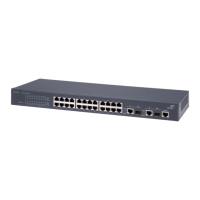1-2
adopts a hierarchical naming scheme to organize the managed objects. It is like a tree, with each tree
node representing a managed object, as shown in
Figure 1-1. Each node in this tree can be uniquely
identified by a path starting from the root.
Figure 1-1 Architecture of the MIB tree
A
2
6
1
5
2
1
1
2
1
B
The management information base (MIB) describes the hierarchical architecture of the tree and it is the
set defined by the standard variables of the monitored network devices. In the above figure, the
managed object B can be uniquely identified by a string of numbers {1.2.1.1}. The number string is the
object identifier (OID) of the managed object.
Configuring Basic SNMP Functions
SNMPv3 configuration is quite different from that of SNMPv1 and SNMPv2c. Therefore, the
configuration of basic SNMP functions is described by SNMP versions, as listed in
Table 1-1 and Table
1-2.
Table 1-1 Configure basic SNMP functions (SNMPv1 and SNMPv2c)
Operation Command Description
Enter system view
system-view
—
Enable SNMP agent
snmp-agent
Optional
Disabled by default.
You can enable SNMP
agent by executing this
command or any of the
commands used to
configure SNMP agent.
Set system information, and specify
to enable SNMPv1 or SNMPv2c on
the switch
snmp-agent sys-info
{ contact sys-contact |
location sys-location |
version { { v1 | v2c | v3 }* |
all } }
Required
By default, the contact
information for system
maintenance is " 3Com
Corporation. ", the system
location is " Marlborough,
MA 01752 USA ", and the
SNMP version is SNMPv3.
Set a
community
name and
access
permission
Direct
configura
tion
Set a
community
name
snmp-agent community
{ read | write }
community-name [ acl
acl-number | mib-view
view-name ]*
Required
z You can set an
SNMPv1/SNMPv2c
community name
through direct

